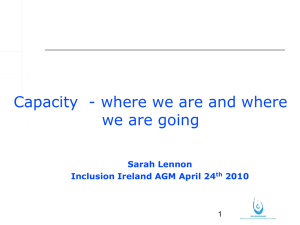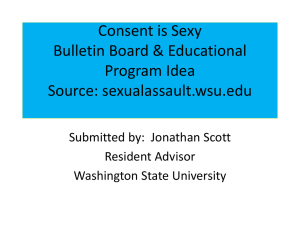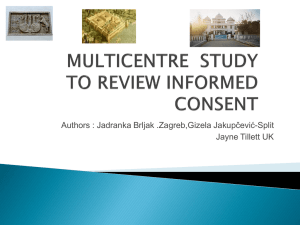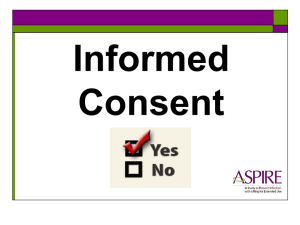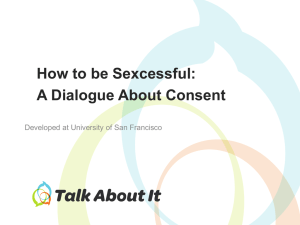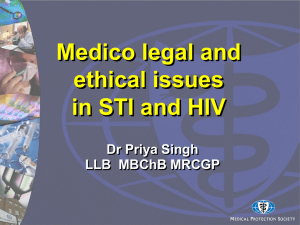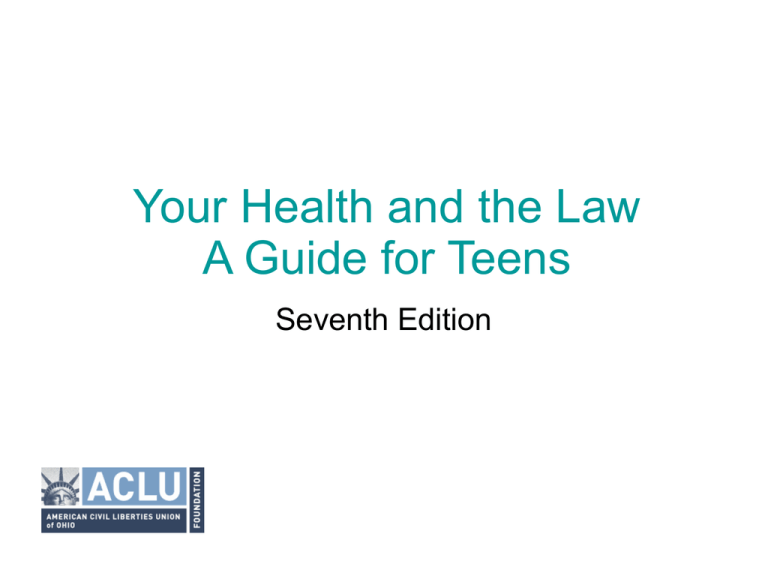
Your Health and the Law
A Guide for Teens
Seventh Edition
Your Health and the Law
A Guide for Teens
Purposes:
●
●
●
●
Educate teens about their rights
Empower teens to make medical
decisions
Educate parents, health providers,
educators, and courts about teens’ rights
Basic information – not legal advice
Teens and Medical Care
●
●
●
●
One of least likely groups in U.S. to have
healthcare access*
Main reason: concerns about confidentiality and
parents being informed
But: law sometimes grants teens confidentiality
and ability to consent without parents
In this presentation: when can teens make own
medical decisions?
*See Charles Irwin, et al., Preventive Care for
Adolescents: Few Get Visits and Fewer Get
Services, 123 Pediatrics 565 (2009).
Issues Covered
Confidentiality
● Consent
● Sexual Health
● Mental Health
● Substance Abuse
● Minors and Violence
●
Basic Definitions
●
What is a minor?
–
●
Anyone between birth and 18 years old
What is an adult?
–
Anyone older than 18
- Except in some cases of mental or physical
disabilities
●
What is a “parent”?
Can be minor’s natural parent, legal guardian, or an
adult with legal responsibility for a minor
Confidentiality
Erin asks her doctor for a
confidential pregnancy test. Her
friend calls later to find out the
results for her. Can the doctor
disclose the results to Erin’s
friend?
Confidentiality
Erin asks her doctor for a
confidential pregnancy test. Her
friend calls later to find out the
results for her. Can the doctor
disclose the results to Erin’s
friend?
Not without Erin’s permission. The information
is confidential and cannot be disclosed to
anyone but Erin.
Confidentiality
●
●
Information about treatment cannot be
disclosed without permission of person who
consented to care (minor or parent), including:
–
Doctor's records
–
School records
HIPAA sets national privacy standards for
health care.
–
When law is unclear: doctors decide
Confidentiality
●
Information may be disclosed:
–
To local, state, or federal government for reporting
–
When a third party is at risk (STD, HIV)
–
As part of a court proceeding
–
When abuse or danger to minor is suspected
Confidentiality
Nurse Smith is a school nurse. One
of her patients, a 16-year-old, has
a bad case of the flu and wants the
nurse to call a doctor. Can Nurse
Smith give the student’s medical
files to the doctor?
Confidentiality
Nurse Smith is a school nurse. One
of her patients, a 16-year-old, has
a bad case of the flu and wants the
nurse to call a doctor. Can Nurse
Smith give the student’s medical
files to the doctor?
Probably not. In certain cases, a minor can
authorize the disclosure of health information.
However, this is generally up to the parents.
Confidentiality
Maria, who is 16, receives
confidential medical treatment and
wants to pay for the treatment
through her parents' insurance
plan. Will information about her be
disclosed to her parents?
Confidentiality
Maria, who is 16, receives
confidential medical treatment and
wants to pay for the treatment
through her parents' insurance
plan. Will information about her be
disclosed to her parents?
Maybe. Some information may be disclosed to
her parents during the insurance
reimbursement process. Maria should ask the
insurance company about the risks of
disclosure beforehand.
Consent
●
What is informed consent?
–
●
Patient understands and voluntarily agrees to a
suggested treatment
Written consent is best, but verbal consent is
also possible.
Consent
●
Informed about what?
–
Necessity
–
Nature and purpose of procedure
–
Risks and benefits
–
Possible alternatives
–
Cost
–
Post-procedure care
–
Second opinion
Minors and Consent
●
Which treatments can minors receive without
parental consent?
–
Emergency health care
–
Limited outpatient mental health care
–
Counseling for eating disorders
–
Alcohol and drug abuse treatment
–
Testing for HIV/AIDS
–
Some family planning services
●
Contract is enforceable
●
Responsible for payment
Parents and Consent
●
Which treatments need parental consent?
–
Abortion
●
–
Exception: Judicial Bypass
Mental Health Care
●
●
●
Inpatient care
Medication
Sessions have expired
Parents and Consent
●
●
Parents who do not consent to medically
necessary care could be charged with neglect
or child endangering.
Parents do not have the right to refuse medical
treatment for their child based on religious
beliefs.
Consent
●
What is emancipation?
Definition: when a minor is considered independent and can
legally consent to his or her own medical treatment.
–
No specific law grants this right in Ohio
–
A teen is not considered emancipated in Ohio even when
financially independent.
–
Emancipation can be granted when a teen
●
marries
●
enlists in armed services
Consent
●
Marriage in Ohio
–
Only between man and woman
–
Male must be 18; female at least 16
–
Everyone under 18 needs parental consent
Sexual Health
A 14-year-old girl, Sally, wants to get
a prescription for the pill. Does she
need parental consent?
Sexual Health
A 14-year-old girl, Sally, wants to get
a prescription for the pill. Does she
need parental consent?
No. Certain government programs provide for
contraceptives, including the pill, to be made
available to minors without parental consent.
Private physicians may provide contraceptives
to their minor patients without parental consent
if the patient is mature enough to give his or
her own consent.
Sexual Health
●
Minors do not need parental consent for:
–
Testing and treatment of STDs, HIV/AIDS
–
Emergency Contraception (EC) – must be used
within 72 hours of intercourse
–
Birth control
–
Pregnancy care
–
Limited counseling sessions
–
Substance abuse/drinking counseling
Sexual Health
●
Anonymous vs. Confidential Testing
–
Anonymous: Recorded by code number
●
–
most private
Confidential: Recorded in patient's medical record
●
More easily accessible
Sexual Health
●
HIV/AIDS Legal Requirement in Ohio
–
An HIV-positive person must inform the following
people of his or her status or face criminal charges:
●
●
●
Future sexual partners
Anyone with whom he/she intends to share a needle
Health workers will notify past sexual partners
of possible infection
Sexual Health
A public health officer tells Larry that
he may have an STD. Can the
officer tell Larry who transmitted it?
Sexual Health
A public health officer tells Larry that
he may have an STD. Can the
officer tell Larry who transmitted it?
No. The officer can reveal only that Larry is at
risk. He or she cannot reveal the name of the
contact.
Sexual Health
●
Disclosure of HIV/AIDS information with written
release of minor may be made to:
–
Physician
–
Police officer
–
Legal guardian
–
Spouse or sexual partner
Sexual Health
●
Disclosure of HIV/AIDS information without
written release of minor:
–
In emergency for patient or child of patient
–
Government health officer
Sexual Health
Kate is 17. She had sex last night
with her boyfriend and the condom
broke. She is scared that she will
get pregnant and her parents will
find out. Is there anything she can
do?
Sexual Health
Kate is 17. She had sex last night
with her boyfriend and the condom
broke. She is scared that she will
get pregnant and her parents will
find out. Is there anything she can
do?
Yes. Kate can use emergency contraception (EC), which
is also called “the morning after pill.” EC stops pregnancy
from happening if it is used no later than 72 hours after
sex. Because Kate is 17 she can purchase EC over the
counter. She does not need parental consent to get EC.
Sexual Health
Rebecca is 16. She is from New
York but is staying in Ohio for the
summer for a music program. She
has found out that she is pregnant
and wants to terminate the
pregnancy. Does she need to tell
her parents?
Sexual Health
Rebecca is 16. She is from New
York but is staying in Ohio for the
summer for a music program. She
has found out that she is pregnant
and wants to terminate the
pregnancy. Does she need to tell
her parents?
Yes. Although teens may undergo abortions in New
York without parental consent, Rebecca is subject to
Ohio law while she is visiting the state. A parent,
custodian, or guardian of a person 17 or younger
must consent to a minor’s abortion. If a parent will
not consent to an abortion, the minor can seek a
judicial bypass.
Sexual Health
●
Abortion
–
Need parental consent (unless exempt)
–
Must meet physician 24 hours in advance
–
Cannot be forced
–
Cannot use state or local public funds to subsidize
cost of abortion unless needed to save physical or
mental health of the mother
Sexual Health
●
Abortion - Judicial Bypass
–
To obtain an abortion without parental consent, a
minor must go to the juvenile court in the county
where she lives or a bordering county and convince
a judge that:
●
●
–
Minor is mature enough to decide on her own
There is a compelling reason minor should be able to
decide
Many women’s medical service providers can assist
with this process.
Mental Health
Rahim is 15. He is severely
depressed and wants mental
health treatment. His parents
refuse to allow it. Can the doctor
treat Rahim?
Mental Health
Rahim is 15. He is severely
depressed and wants mental
health treatment. His parents
refuse to allow it. Can the doctor
treat Rahim?
Yes, if Rahim consents to the treatment.
Mental Health
●
Minors may receive outpatient counseling
without parental consent:
–
Must be at least 14 years old
–
Limited to 6 sessions or 30 days, whichever comes
first
–
No medication
Mental Health
●
●
●
Parents will be notified of mental health
treatment if:
–
Minor consents to notification
–
Minor is likely to harm someone
Provider must first inform minor that parents will
be notified
After treatment limit:
–
Stop care or parental consent needed
Substance Abuse
Lee is 16. He is thinking about
talking to a school counselor about
his drinking problem but is scared
that his parents will be notified.
Can he receive counseling without
parental consent?
Substance Abuse
Lee is 16. He is thinking about
talking to a school counselor about
his drinking problem but is scared
that his parents will be notified.
Can he receive counseling without
parental consent?
Yes. A minor does not need parental consent
to receive counseling. Whether or not the
counselor decides to treat Lee, his parents
cannot be informed without his permission.
Substance Abuse
●
●
Alcohol and Drugs:
–
No parental consent needed for treatment
–
Records stay confidential
Cigarettes and Tobacco
–
Illegal for minors to use, buy, or obtain
Minors and Violence
●
Child Abuse
–
When an adult with custody of a minor harms the
minor or allows the minor to be in a harmful
situation.
–
Focuses on parent/caretaker's treatment of minor
–
Responsibility to report suspected abuse
–
Child Abuse Prevention and Treatment Act (CAPTA)
●
You can be prosecuted for knowingly lying about abuse.
Minors and Violence
●
Sexual Violence
–
Violation and abuse of a person's body
–
Most common forms are rape and sexual assault
–
Victims should seek medical care as soon as
possible
Minors and Violence
●
Rape:
–
●
Any forced penetration, including intercourse, oral
sex and anal sex. Rape is always wrong and should
be reported immediately.
Sexual Assault:
–
Inappropriate touching, especially of sexual organs.
Minors and Violence
●
Medical Examination of a Minor:
–
Minor can consent to an examination for the
purpose of gathering physical evidence
–
Ohio law provides free emergency room
examinations to all victims of sexual assault
offenses
–
Parental consent not required
–
Hospital must give the parents written notification of
the examination
Your Health and the Law
A Guide for Teens
Summary
●
●
●
●
Minors who are married or in the armed forces
can consent to all of their own health care
All others can consent to only certain
procedures
All must understand risk and benefits of
treatment in order to give “informed consent”
Adults must protect confidentiality
Resources
●
●
●
●
Center for Disease Control
●
1-800-227-8922.
Women, Infants and Children (WIC)
●
614-644-8006
National Domestic Violence Hotline
●
1-800-799-SAFE
National Hopeline Network:
●
1-800-SUICIDE
●
●
www.hopeline.com
Anorexia Nervosa and Associated Disorders (ANAD)
●
847-831-3438
●
www.anad.org
Credits and Ordering
●
●
Thank you:
–
Friedman-Klarreich Family Foundation
–
ACLU volunteers and student interns
Ordering:
–
www.acluohio.org (publications)
–
(216) 472-2220


